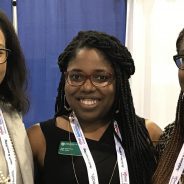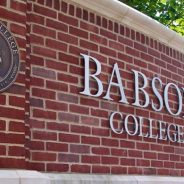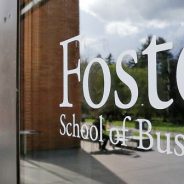Search results for forte:
The Top 5 Reasons Diversity MBA Conferences Should Be on Your Recruiting Calendar
Pictured above: Tuck second-year MBA students Bianca Goins, Sadé Lawrence, and Jodine Gordon.
More than 10,000 MBA students, business school representatives, recruiters, and business executives filled the Pennsylvania Convention Center in Philadelphia late last month for one of the largest career conferences serving minority professionals. The conference has been around since 1970, but for the first time this year the National Black MBA Association (NBMBAA) and Prospanica, the association of Hispanic professionals, joined forces to present it. The result was an incredible opportunity for attendees to network with companies and each other, take advantage of career development programming, and interview for and secure job offers from hundreds of companies spanning multiple industries.
Cornell’s S.C. Johnson Graduate School of Management had a group of approximately 55 students attend, a mix of first-year and second-year students, according to Cynthia Saunders-Cheatham, Executive Director of Johnson’s Career Management Center.
“It was double what we have had in recent years, and perhaps the largest attendance we ever had for an MBA diversity conference,” she said. “Having a joint NBMBAA/Prospanica conference, in addition to the Philadelphia location that was driving distance away [from Ithaca, NY, where Johnson is located], helped to drive attendance.” The connections that students made while there have already resulted in multiple job offers, she added.
While securing a job or internship is a primary reason many MBA students choose to attend the National Black/Prospanica conference and others like it, that’s just one of many potential benefits events like this offer. Given that this most recent conference was right here in our hometown of Philadelphia, we went to check things out for ourselves. Through conversations with attendees, school representatives, and recruiters, we’ve compiled the following list of reasons why this year’s crop of applicants should be sure to add diversity MBA conferences to their recruiting calendar next summer and fall.
1. Unparalleled Recruiter Access—Including Many That Don’t Come to Campus
The Career Expo, which took place on the last two days of the five-day National Black/Prospanica conference, filled a cavernous hall in the Convention Center and included booths from close to 300 companies spanning dozens of industries. Among them were coveted post-MBA tech employers like Google and Amazon, consulting industry leaders including Bain & Company and Accenture, and financial services firms such as BlackRock, Bank of America, and Morgan Stanley. There was a continuous gaggle at the Google booth, and one of its MBA internship recruiters, Tanya Choudhury, had to resort to wearing a sign by the second day explaining that she’d lost her voice.
Big pharma and healthcare were also well represented, with booths attended by recruiting representatives from drug maker AstraZeneca to medical products and equipment company Zimmer Biomet and many in between. Leading consumer packaged goods (CPG) firms including PepsiCo, General Mills, and Proctor & Gamble were also there, as were oil and gas giants like BP, Chevron, and Exxon.
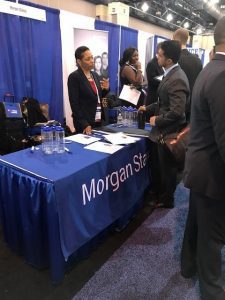
Morgan Stanley was one of almost 300 exibitors in the conference’s packed Career Expo.
But there were also plenty of organizations that are perhaps less top of mind as potential MBA recruiters—the Central Intelligence Agency, the U.S. Department of State, Teach for America, and USAID, for example—who were just as eager to share how highly they value the MBA skillset. Dozens of leading business schools also had booths, largely to provide support and serve as gathering places for students who were attending, but also with an eye out for promising diverse talent. For example, Roberto Martinez, a Senior Talent Acquisition Consultant for Dartmouth College—home to the Tuck School of Business—was eagerly distributing glossy handouts touting the school’s varied career opportunities, commitment to diverse hiring practices, and excellent benefits. “We’re here not only to support students but also to hire more diverse staff to campus,” he said.
For Tuck second-year MBA student Bianca Goins, the breadth of companies at the expo was a big part of the draw. “I wanted a diverse group of companies to look at in a single spot,” she said. “There are so many companies here, and as second-year you can really come and pick and choose the experiences you want to have.”
Tiffany Anderson, a second-year student at Emory’s Goizueta Business School, was also impressed by the sheer number of companies present. A self-proclaimed conference veteran, she also attended National Black last year, as well as conferences presented by the Forté Foundation, the Consortium for Graduate Study in Management, Management Leadership for Tomorrow, and JumpStart. “Out of all the diversity conferences, I would certainly say this is the flagship,” she said. “Wow! There are A LOT of companies here,” she recalled thinking to herself as she walked in. More so than last year, before National Black and Prospanica teamed up, she added.
“I have seen the most people—students from many different schools and recruiters from many different functional areas of interest,” she continued. “It seems to be the most diverse in terms of attendees, degree of programming, and companies in attendance. For the majority of people, this is going to be one of the best to attend.” Anderson estimates that there were probably 30 or so Goizueta students there, a mix of first- and second-years.
2. Multiple Touch Points and Opportunities for Face Time
For some students, certainly, the primary purpose in attending the conference is to land a job. Second-year IU Kelley School of Business MBA student Henrique Barbosa, a native of Brazil pursuing travel hospitality, had a simple answer when asked why he was there: “To get a job!” He acknowledged that most of the firms he was interested in only conduct first-round interviews at the conference followed by second-round interviews on site, which lessened the likelihood of his leaving with an offer in hand. “But it would be great if it happened,” he said.
But several other students were less interested in job or internship offers—or even in early round interviews. For Jodine Gordon (Tuck ’18), the biggest factor in her decision to attend was hearing success stories from Tuck grads whose higher-level touch points with conference recruiters later helped them secure offers. “I have a couple companies on my list, but really I just want to meet as many people as possible so they can get to know me and I can get face time,” she said.
Sadé Lawrence, also a second-year student at Tuck, was likewise attracted by the opportunity to get in front of recruiters in person. “For a lot of opportunities you might be interested in, you start online at a website, applying through data base,” she said. “But coming here they now have a face with your name, and there are all kinds of organic connections that can happen,” she added. “It’s kind of amazing that you are able to build connections with people even at such a big conference, but you are. You make contacts and get lots of face time—so much more so than you can blindly through a website,” she continued. “What I have heard more of is people have an interaction with a recruiter here that leads to an interview later—here is more about entering the pipeline.”
Tuck’s Goins has taken the opportunity to network with recruiters who don’t make it to Tuck’s campus, but also those who do. “With every interaction, you are getting a more nuanced understanding of the company and can take that information and use it in subsequent interactions.”
3. Valuable Chances to Network with Peers
Goizueta’s Anderson interned in operations at Google over the summer—an opportunity she got through another diversity conference—and has been offered a full-time position on the tech giant’s Mountain View campus after she graduates. Despite having that full-time offer in hand, attending the conference still made lots of sense.
Kelley School second-year student Luis Vilchez Kupres, a native of Peru, also converted his summer internship—in supply chain operations at Cummins—into a full-time offer. So his reasons for attending the conference were not to get a job. ”I am here to support fellow Kelley first- and second-years and network a little more,” he said. He also gets to reconvene with students from other schools he met at last year’s Prospanica conference. “Often, you connect with somebody and they will help you connect with someone else,” he said. “Networking definitely helps—even among other MBA students.”
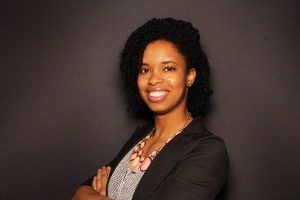
Tiffany Anderson, Goizueta MBA ’18, a diversity MBA conference veteran
For the Google-bound Anderson, the value of peer networking can’t be stressed enough. Being able to connect with students from other schools is the part she finds most enjoyable—but it’s also strategic. “When candidates are selecting a school they like to look at the size of the network they are going to get—and that’s great,” she said. “But the way I see it, I don’t have to be at Stanford or Wharton because I have friends at Stanford and Wharton. So in a way that’s kind of my network, too.”
“You have that domino effect,” she continued. If she’s trying to connect with someone at a company where she doesn’t have a contact or her classmates don’t have contacts, she can reach out to a friend at another school to see if there’s someone in their network. “Some might say, ‘Well, they’re a peer, they’re not an employer, they’re not going to get me a job.’ But there is so much more benefit to expanding your network. I don’t think everyone understands that.”
Of course, peer networking can be a two-way street. “My motivation to expand my network comes from wanting to help others as well,” Anderson said. “When you are part of these diversity networks, one of the great things is you are going to have a friend who says, ‘Do you know someone who can help me with this?’ And I can say, ‘Well, I met someone at a conference who does that very thing and I’m happy to put y’all in touch.’”
How the Chicago Booth School of Business Helps Low-Income Applicants
U.S. News and World Report lists University of Chicago’s Booth School of Business among its top three best business schools in the country. But with the school’s estimated tuition (including living expenses) for the 2017-18 year at $103,759, Booth may not sound like a practical option for a number promising candidates. Though the $126,937 average base salary of graduates is definite proof of return on investment, for many, the cost of tuition may make the idea of earning a Booth MBA seem impossible. Fortunately, the myriad loan and scholarship options available at Booth may make a Booth MBA more feasible for students from all economic backgrounds.
Those of you craving a challenging higher education experience at one of the most prestigious institutions in the U.S. can breathe a sigh of relief. Below, we’ve laid out some of the resources available to help low-income applicants fund their MBA education at Booth School of Business.
Scholarships and Fellowships
Though Booth does not offer need-based financial aid, there are a plethora of merit-based scholarships and fellowships available to promising students. According to the school’s website, awardees are chosen based on the quality of their interview, their academic merit, their prospective concentration, competitiveness, career goals, and life experiences.
Specialized scholarships are available to minority students, veterans, and students with outstanding scholastic achievements. There are also industry-specific opportunities, such as the Canfield Private Equity Fellowship, which is specifically geared toward students with a background in private equity or investment banking, and even includes an internship at a private equity firm.
Take a look at some of the more prominent Booth scholarships available:
Chicago Booth Merit-Based Award
- This general scholarship is awarded to select students at the time of admissions based off, according to the school, “who have excelled in academics, work experience, and service to the community.”
George J. Stigler Fellowship
- This awarded is granted to students who excel in fields such as law, economics, and business.
Forté Foundation Fellowship
- This full-time MBA awarded is gifted to students through the forward-thinking Forté Foundation every year for students that “exhibited exemplary academic, team, community, and/or creative leadership, and are committed to advancing the interests of women in business.”
Distinguished Fellowship
- Students granted this high-ranking fellowship receive a “stipend and mentorship from Harry L. Davis, the Roger L. and Rachel M. Goetz Distinguished Service Professor of Creative Management.” The fellowship covers a student’s entire tuition.
David W. Fox Scholarship
- Another full-tuition award, the David W. Fox Scholarship is gifted to students that have previously or are currently serving in U.S. military. The school notes, “Students must demonstrate outstanding leadership, academic and extracurricular achievements, and a commitment to advancing the interests of those having served in the military.”
You can learn more about Booth’s scholarship opportunities here.
Loans
Booth students who are U.S. citizens or permanent U.S. residents can apply for a variety of federal or private student loans. Students looking for federal loans can choose a Direct Unsubsidized Loan or a Direct Grad PLUS Loan. To qualify for the Direct Unsubsidized Loan, students must be enrolled in at least 200 units each quarter. The maximum amount students can receive with this loan is $20,500 per year. Students who require more than $20,500 per year can apply for the Direct Grad PLUS Loan, which has a much higher cut-off. With this loan, students can receive up to the total cost of attendance (minus any other outside financial support). Students who opt for private, credit-based loans can also borrow up to the total cost of attendance, not including separate sources of financial assistance.
International students also have the option of leaning on loans to help finance their MBA. Booth provides loan options for international students without U.S. cosigners, as these students may not be eligible for private loan options. Those with U.S. cosigners, however, have a wide selection of private loan opportunities available to them.
Do Women Entrepreneurs Get Less VC Funding? Wharton and Columbia Researchers Find a Large Gender Gap
Over the last few years, there has been a lot of talk about more women in business. From the promotion of organizations like the Forté Foundation—which seeks to enhance women in business—to CNBC claiming “the Golden Age for women entrepreneurs has finally begun,” enterprising women seem to be everywhere. Unfortunately, this doesn’t mean that the deck is stacked in their favor. In fact, researchers from Columbia Business School and The Wharton School found the opposite was true.
The Gender Gap in Startup Funding
In a paper published in the Academy of Management Journal titled, “We Ask Men to Win & Women Not to Lose: Closing the Gender Gap in Startup Funding,” researchers looked at how women fared compared to men when they were trying to get funding for their startups.
After reviewing footage from the TechCrunch Disrupt startup competition, the researchers found that women were asked entirely different types of questions about their companies compared to their male counterparts. Men received more questions about their project’s potential for growth, while women received questions on the opposite end, about their potential risks and losses. This difference in questioning had a measurable impact on the funding each startup received.
The research paper, written by Dana Kanze (a Columbia Business School Ph.D. student), Laura Huang (a Wharton School Professor), Mark A. Conley (a Columbia Psychology Ph.D.), and E. Tory Higgins (a Columbia Psychology Professor), sought to delve into the enormous gender gap revealed in venture capital funding. According to the paper, only 2 percent of VC funding goes to women entrepreneurs in spite of the fact that women own 38 percent of U.S. businesses and represent 7 percent of venture capital firms.
One of the keys to this drastic difference in funding was how VCs—both male and female—framed funding questions for women-created businesses. Kanze explained the thought process in a Forbes article.
“According to the psychological theory of regulatory focus, investors adopted what’s called a promotion orientation when quizzing male entrepreneurs, which means they focused on hopes, achievements, advancement, and ideals,” Kanze said. “Conversely, when questioning female entrepreneurs, they embraced a prevention orientation, which is concerned with safety, responsibility, security, and vigilance.”
Inside the Research
To study how this difference in questioning impacted women and men entrepreneurs, the research team reviewed the Q&A sessions of 189 startup entrepreneurs—12 percent of whom were women—held by 140 prominent venture capitalists—40 percent of whom were women. Using software to analyze each session, researchers discovered that 67 percent of questions posted to men were promotion-oriented while 66 percent of questions posted to women were prevention-oriented.
In the end, the study found that this difference in questioning led to a huge difference in VC funding. Among comparable companies, the research team found that businesses that were asked prevention-oriented questions raised (on average) $2.3 million in funds in 2017, while their promotion-focused counterparts raised $16.8 million—nearly seven times more.
“In fact, for every additional prevention question asked of an entrepreneur, the startup raised a staggering $3.8 million less, on average,” Kanze told Forbes. She continued, saying, “Controlling for factors that may influence funding outcomes—like measures of startups’ capital needs, quality, and age, as well as entrepreneurs’ past experience—we discovered that the prevalence of prevention questions completely explained the relationship between entrepreneur gender and startup funding.”
However, there was some good news. For female entrepreneurs who received prevention-focused questions but responded with promotion-type answers, they were able to raise $7.9 million, versus $563,000. This suggests that regardless of how VCs phrase their questions, entrepreneurs can recover much of their funding potential if they answer in the positive.
To test their findings, the research team conducted an experiment that recreated the TechCrunch Disrupt conditions with 194 VCs—30 percent of whom were women—and 106 entrepreneurs—47 percent of whom were women. After removing startup specific details, the team asked the VCs to allocate $400,000 to their chosen entrepreneur.
According to the Kanze in a Harvard Business Review article, the team found that: “Angel investors allocated an average of $81,113 to startups in the prevention question, promotion answer condition—1.6 times larger than the $52,369 average allocated to those in the prevention question, prevention answer condition. Similarly, ordinary investors gave an average of $96,321 to the prevention question, promotion answer condition—1.7 times larger than the $55,377 average given to the prevention question, prevention answer condition.”
Speaking with Professor Laura Huang
To gain additional insight into the results of the research paper, we spoke with Professor Laura Huang at the Wharton School. Here’s what she has to say.
- What was the most surprising result that came out of your study?
“It was surprising that both men and women investors were equally as likely to ask prevention-focused questions to women, as opposed to promotion-focused. It wasn’t that men were the only ones biased, but that both genders were equally as likely to be biased.”
- Do you have any advice for female entrepreneurs looking to raise venture capital?
“Stop it in its tracks. When you see something like this happening, stop it immediately and redirect the response so that you’re making yourself on equal footing. Don’t allow that train of thought to go through where you’re getting asked prevention-focused questions and investors are focused on the risk. Answer the question that’s asked but redirect your response toward possibilities and success.”
- How do you think VC funding can change for the future to close the gender gap?
“Part of it is an awareness on the investors’ side. It’s also up to the entrepreneurs to redirect each question toward the right focus. A lot of this gap is implicit. Investors don’t realize they’re asking prevention-focused questions of women; they just automatically ask certain questions to each gender. Awareness around the tendency toward prevention-focused questions for women entrepreneurs and a focus on redirection toward promotion is key.”
Babson Expands Entrepreneurial Opportunities for Women MBAs
While more women than ever are earning MBAs, there’s still a lot to be done to advance the role of women in business. Though the average enrollment of women in full-time MBA programs at 36 top business schools climbed from 32 percent to 36 percent between 2011 and 2015, that growth hasn’t necessarily been reflected in the workforce yet. Women occupy only 22.9 percent of board positions for Fortune 500 companies and only 6.4 percent of CEO positions.
Babson’s Women Innovating Now (WIN) Lab is part of that school’s effort to bridge this gap and increase the number of women leaders in business. Continue reading…
Babson College Helping Empower Women in School and Beyond
Despite improvements in recent years, women remain underrepresented in MBA classrooms and don’t participate in the global economy to the same extent as men. It’s a persistent issue, but one that many business schools and foundations are working to address by demonstrating successful female leadership and implementing programs to empower women in business. As a part of that effort, Babson College and the F.W. Olin Graduate School of Business recently announced that Liberian President Ellen Johnson Sirleaf would address their undergraduate and graduate students during their commencement ceremonies. Continue reading…
The McCombs Scholarships You Need To Know
For many students looking to pursue a graduate business degree, the cost of an MBA can be a huge deterrent. As an unfortunate result, many qualified and ambitious student choose to not pursue the furthered education they deserve. Luckily, most business schools offer exemplary scholarship remedies to help alleviate costs. For those looking to pursue an MBA at Texas A&M University, we’ve listed the McCombs scholarships you need to know.
Continue reading…
The HERWorld Energy Forum at Rice’s Jones Graduate School
Bridging the gender gap in business has been an increasingly hot topic in recent years. As evidenced by the Fearless Girl statue facing off against the Charging Bull on Wall Street, and the women’s marches that took place across the country earlier this year, both women and men are speaking up for equality in the business world. The recent HERWorld Energy Forum is yet another example. Continue reading…
Top Scholarships at Columbia Business School
Earning an MBA from Columbia Business School (CBS) is an incredible opportunity. It is no secret that CBS offers an enviable education, but it is also located in the heart of New York City, where MBA students will be surrounded by opportunities and industry giants. Of course, being in the fastest-paced, most populous city in the United States comes at a price. Literally. New York is listed as number one on Investopedia’s Top 10 Most Expensive Cities in the U.S. Luckily, CBS offers a wealth of scholarships to make grad school in the city more manageable.
Merit-Based Scholarships
Merit-based scholarships are an excellent option for motivated students with impressive undergraduate GPAs and work experience. Also, if students do not receive a fellowship in their first year, they will have another opportunity in their second year.
• Forté Foundation Scholarship: The Forté Foundation offers scholarships to outstanding women through their Forte Fellows program. The fellowship exists to encourage larger numbers of women to pursue an MBA education. There is no application information required from students at CBS, as nominees are selected by the school’s director of admissions. Forté Fellows receive multiple benefits, including participation in the MBA Women Leadership and Financial Services FAST Track Conferences. Students in the program are also included in the Forté Fellow resume book, which is distributed to Forté Sponsor companies like J.P. Morgan and IBM Global Business Services.
• Toigo Fellowship: CBS is one of the Robert Toigo Foundation’s featured MBA programs. The Toigo Foundation’s mission is to encourage diversity in finance, so this fellowship is available to under-represented groups. Driven minority students will be eligible for consideration. Fellows attend a weekend summer session to prepare them for business school. During this session, students are assigned mentors to guide them throughout school and their careers.
• Columbia Fellows Program: Columbia Fellows is available only for the first year of the program. The scholarship includes a partial- or full-tuition award for applicants who have shown the creativity and initiative to be true leaders in business.
• Board of Overseers China & India Fellowships: This fellowship is available to students from China and India. Scholarships are awarded by the Board of Overseers, which is comprised of industry giants across a variety of fields.
• Meyer Feldberg Distinguished Fellowship Program: This fellowship is extremely competitive and is granted to students who have shown outstanding leadership skills and academic initiative. Students applying must demonstrate an impressive track record in areas like entrepreneurship and social ventures. Fellows are given full tuition and lifelong membership in the prestigious network of award recipients and donors.
.
• R.C. Kopf Fellowships: The R.C. Kopf Fellowship is granted to students with an interest in international business. Italian, French, British and U.S. citizens can all earn the Kopf Fellowship. Applicants should be accomplished in academia, but also exhibit personal and professional behavior that makes them an asset to the community.
• Gerardo Werthein Scholarship: This scholarship is specifically for MBA students who have lived or studied in Argentina and who are interested in returning to work in Argentina. The scholarship is granted based on financial need.
• Ela Lemelbaum Scholarship: Israeli students are eligible to receive the Ela Lemelbaum Scholarship, which provides tuition support options for both first and second years of study. Preference goes to students who have studied at the Interdisciplinary Center in Herzliya, Israel. This scholarship is renewable during the second year.
Other Scholarship Opportunities
CBS also offers a variety of need-based scholarships to students, which may yield tuition support ranging from $7,500 to $30,000. Need-based scholarships are based on every aspect of a student’s assets. About 50 perfect of applicants are granted need-based awards. These scholarships are automatically renewed during a student’s second year. There is a rigorous four-part application process. Students may also seek out and apply for external scholarships.
What Bain & Company Looks for in MBA Hires
Bain & Company—widely considered one of the most elite consulting firms in the world—is a coveted post-MBA destination for students at top business schools in every part of the globe. Headquartered in Boston with 53 offices in 34 countries around the world, Bain employs more than 7,000 people and counts as its clients leading Fortune 500 companies, as well as nonprofit and government organizations. And business is booming.
According to Keith Bevans, Global Head of Consultant Recruiting, the company has grown at a rate of 15 percent a year for the past 20 years, with no slowdown in sight. “We hire a little over 400 consultants a year—and that growth comes from the top business schools in the world,” he says. While the company primarily targets top-20 schools for MBA recruiting, it hires from more than 60 schools around the world and is committed to finding the best talent wherever it can.
Bevans is a Bain-lifer. He started as an associate consultant out of MIT, where he earned his bachelor’s and master’s degrees in engineering. He left Bain to get his MBA at Harvard Business School but returned upon graduation and has been there ever since. For much of his career, he was a client-facing partner in the firm’s Performance Improvement practice, with a focus on processes to improve effectiveness and efficiencies. Now he’s putting that expertise to work for his own company, and he couldn’t be happier.
His allegiance to the firm is clear, and it’s based in great part on his intimate understanding of its culture, which he describes as steadfastly collaborative and supportive. And he’s not alone. Bain frequently tops the “Best Places to Work” lists for Glassdoor, Vault and Consulting magazine, with employees praising its “great people and culture” and calling it “an incredible place to learn” and “the best place to start your career.”
It’s people, too, set Bain apart, Bevans agrees. “They are very smart, very passionate, maniacally focused on making a difference in whatever they are doing—and they wrap all of that in a layer of humility, which I think is very rare to find.”

Bain Partner Keith Bevans, Global Head of Consultant Recruiting
But interns alone are not enough to keep up with Bain’s growth. “It varies from year to year in terms of how many of our full-time hires are former summer interns, new full-time hires or former consultants. But the internship program never fills up the whole group.”MBA graduates are a big and important part of the company’s hiring, and many start out as interns in the 10-week summer associate program between their first and second years of business school. “It’s definitely an important on-ramp,” he says of the internship program, adding that it’s also a valuable opportunity for both Bain and its interns to determine fit. Notably, 90 percent of interns return to work for Bain full-time, Bevans adds. And there’s not a maximum cap on intern hires. “Our summer program is limited only by how many great students we can find,” he says. “We don’t have a target—rather I like to think of it as a minimum. If we find more great people, we will always go over whatever we set out for.” Which means there are opportunities for second-year students who may not have targeted Bain or consulting in their first year.
But interns alone are not enough to keep up with Bain’s growth. “It varies from year to year in terms of how many of our full-time hires are former summer interns, new full-time hires or former consultants. But the internship program never fills up the whole group.”
Don’t miss Clear Admit’s exclusive interview with Bevans, in which he talks about the firm’s commitment to employee training and support, goes into detail about Bain’s MBA recruiting process, shares where he looks and what he looks for in MBA hires and more. Our thanks to Bevans for making the time to share more about Bain with the Clear Admit audience.
Corporate Recruiter Q&A: Bain & Company’s Keith Bevans
Clear Admit: What sets Bain apart—not only among other consulting firms but also as an employer or company overall?
Keith Bevans: There are a couple of things about Bain people that set us apart. In my role, I have had the opportunity to travel to offices around the world hiring people, and what I have found is that Bain people are passionate about both the work they are doing and the things they are doing outside of work. They really jump right in with both feet. When you align that around our goal of having our clients be successful, you can really see the passion Bainies have for their clients—it just oozes out of them. We are having a big impact on our clients, and we are hiring people who are really energized by that.
With that as our starting point, we put them in an environment where we really do act like one team and do everything we can to support them in their professional life. From our global training programs to our onboarding program to the career counseling we provide—it’s all aligned around helping them be successful and be the best they can be. Bain people are people who want to have an impact.
Relative to other firms I think we are different in the sense that we have a very collaborative culture. We also have tremendously deep expertise in every major sector of the economy, and we bring that to our clients. “We’ve studied this and analyzed this, but why don’t we marry that with your expertise?” we’ll say to clients. We are not trying to prove that we are smarter than our clients but to work collaboratively with them to position them to succeed.
CA: How important are MBAs in your overall hiring? How many MBAs do you hire each year, both interns and full-time? Are you continuing to grow at the 15 percent rate you’ve enjoyed for so many years?
KB: MBA talent is a big and really important source of talent for us. For the last 20 years, we have been growing on average at a rate of 15 percent per year. That makes for a phenomenal slide when I put it in front of recruits. We hire a little over 400 consultants a year, and that growth comes from the top business schools in the world. The bulk of our targeted efforts focus on top 20 programs, but we have hired from almost 60 different MBA programs around the world.
With our growth, our primary focus is to make sure we are finding the most talented people out there. The breadth of schools from which we’ve hired shows that we are continuing to do innovative things through the Bain Passport and Webinar series to connect with students wherever they are. Our intern program this summer is once again—for the third or fourth year in a row—the largest we have run as a firm. It is definitely an important on-ramp, if you will. And 90 percent of the MBA interns who come for the summer return to Bain afterwards. We find the best, bring them in for the summer and very often they start their careers with us.
As for the 10 percent who don’t return—most of the time it’s actually more of a mutual thing. Maybe they tried consulting and decided it’s not a fit for them. And here’s another example of the supportive part about Bain: Even the interns who don’t come back often get support from the people who worked with them at Bain. They help them identify what parts of the internship were the right fit, and what roles might be a better match and then they help connect them with people who can help. After all, they are still Bain alums and still part of the Bain family.
Introducing The UW Foster Full-Time MBA Class of 2018
Are you thinking about heading to the Foster School of Business at the University of Washington for your MBA? It’s a good choice. Not only is Foster’s full-time MBA program ranked first overall in the Northwest by the U.S. News and World Report, Bloomberg Businessweek, the Economist and the Financial Times, it’s also ranked in the top 30 nationwide by all the same reports. But, it’s not just rankings that indicate an excellent full-time MBA program; it’s also the student experience. Continue reading…
Discover How the Smith School Promotes Women in Business
What were more than 200 Girl Scouts doing at the University of Maryland’s Robert H. Smith School of Business? They were attending Cookie College, of course!
On December 10, 2016, more than 225 Brownies and Juniors from kindergarten to fifth grade headed to the Robert Smith School of Business to learn about the business of selling cookies. “The girls learned life skills like goal setting and money management that will help them in all aspects of life,” Sara Tyler, program specialist at the Girl Scout Council of the Nation’s Capital, said in a news release. “It sets them up for life.”
The girls also received additional benefits, such as learning about higher education and meeting female role models. It was an empowering event that was women-led and girl-attended, and it was all a part of the Robert Smith School of Business’ broader initiative: 50/50 by 2020. Continue reading…
3 Rotman Grads Named Canada’s Most Powerful Women
If there’s one thing that everyone can agree on, it’s that women are necessary for business. In fact, companies with a female on the board of directors, on average, have a 53 percent higher return on equity. The issue is that though women represent 47% percent of the workforce, they only represent 17 percent of boardrooms, and 4.8 percent of CEOs among the Fortune 500 companies, according to the Forté Foundation.
That’s why University of Toronto’s Rotman School of Management has made it a priority to promote women in business. And their efforts have recently been rewarded with both a Rotman professor and two alumni named to the Women’s Executive Network (WXN) list of Canada’s Most Powerful Women for 2016. The list featured 100 women in total, including several graduates of the Rotman School’s Judy Project and Executive Programs. Continue reading…
Foster Difference Fund Increases Diversity
According to UW Today, the 2016 University of Washington fall class was the most diverse yet. The university welcomed 976 underrepresented students, a new record number. But that’s not the only place where the university is encouraging diversity. The Foster School of Business also promotes diversity, and thanks to the Foster Difference Fund, the school was recently able to launch a few new initiatives and partnerships to help them reach their goal of inclusiveness. Continue reading…
Best Boston MBA Programs For Your Buck
It would be a gross understatement to characterize earning a business school degree as a major investment of time and resources. For the vast majority of applicants, choosing the right school is often a matter of choosing the one they can afford. But if there’s any city in the North America that offers a veritable gallery of business schools for any budget, it’s Boston. We surveyed the Boston scholarship landscape so you don’t have to, and here are the best Boston MBA programs for your buck:
Continue reading…
Imperial College Business School Recognized for Combatting Gender Inequality
Gender inequality in higher education is a common issue, which is why the Imperial College Business School has been working to support equality and diversity for staff and students. And recently, the Equality Challenge Unit (ECU) recognized its efforts by awarding the school with a Bronze Athena SWAN award. Continue reading…
2 Female EMBAs Win Scholarships from Saïd Business
Saïd Business School at the University of Oxford is committed to empowering the next generation of women leaders. To achieve their goal, they awarded two exceptional female candidates with scholarships to help support their career goals. Continue reading…
“Mr. Diabolical Himself,” Steve Richardson, Michigan Ross MBA
Not unlike his Green Mountain State neighbors Bernie and Ben & Jerry’s, Stave Puzzles’ co-founder and self-described “chief tormenter” Steve Richardson makes a compelling argument for abandoning the well-trodden post-business school path for a slower, more scenic route—albeit one with a byzantine road.
USD Ranks as Top MBA Program for Women
If you’re a woman looking to get your MBA, then you should head to the University of San Diego School of Business Administration. According to the U.S. News & World Report, USD enrolled 45% women into its program in 2015, making it one of the top 25 schools in the nation for women MBAs. In total, USD has 80 full-time women MBAs enrolled in their program. Continue reading…

